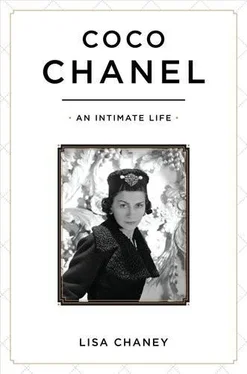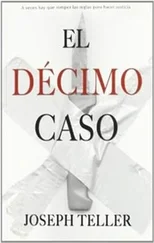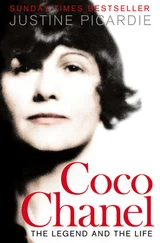Although this extraordinary book was first published in German, French-and English-language editions were published in 1936 and gradually those in Paris got word of it. This exposé of von Dincklage’s activities must have unsettled him a great deal. While he was a master at deception and duplicity, and would have been most convincing in his persuasion that The Brown Network was a scurrilous fabrication, the episode cannot but have been a serious bar to his promotion to the highest ranks of Nazi espionage.
Understandably, after the book’s publication, von Dincklage absented himself from Paris for some months. During this period, he persuaded Catsy that he must divorce her. Their divorce papers don’t give the real reason — in other words, Maximiliana von Schoenebeck’s Jewishness — instead, the cause is stated as their failure to have children. 20Von Dincklage returned to France, and although Catsy felt bitter and still cared for him, she agreed to keep their divorce a secret. 21In Paris, while her ex-husband continued at the fine addresses where he always managed to live, he also maintained his extensive reputation as a Don Juan. Marriage had in no way held up the progress of von Dincklage’s conquests; it had simply given them an extra frisson. And he now asked Alex Liberman if he would introduce him to Comtesse Hélène Dessoffy.
Hélène Dessoffy and her husband, Jacques, “had enough money never to need to work, and channelled most of their energies into buying and redecorating their houses. Hélène was the daughter of a high-ranking naval officer, a horsy, long-legged, chain-smoking woman with… a wry, swift wit.” 22Wasting no time, von Dincklage was soon launched into “a torrid affair” with her. Unknown to Hélène Dessoffy, when her lover traveled south to spend time with her at Sanary (she and her husband lived “rather separate lives and usually inhabited separate villas” 23), he would also visit his ex-wife nearby. At the same time, von Dincklage continued his long-term surveillance of the Jews of Sanary and the French naval port of Toulon across the hill. Now that he was divorced, his affair with Hélène Dessoffy gave him another alibi for being in the south. 24
While the above narrative gives some insight into von Dincklage’s character and his multifarious activities, he continued to charm and amuse his way into the lives of an expanding Parisian circle, and we find the odd tantalizing glimpses of him in the late thirties. Here also we discover some of the conflicting information that would later circulate about both von Dincklage and Gabrielle. Remembering that von Dincklage wanted his divorce kept secret, the following is at first puzzling: “Baron Hans Günther von Dincklage was celebrating his recent divorce by practically living in the bar at the Ritz, where he clearly demonstrated his expertise with women, wine, food and cigars… He flitted about, making friends, telling the latest jokes.” 25
On one occasion, the manager of the hotel was outraged and told von Dincklage to leave his office when he attempted to organize a black-market deal with the hotel to buy German wines. He had said it was “at the request of our mutual friend Joachim von Ribbentrop. You know of course, how important he now is in my government, the Third Reich.” The manager was furious and expelled him from his office. He told his wife that von Dincklage was “free to move around the hotel where I cannot stop him. But I can stop him from access to the offices and the cellars!” He then said to her: “Don’t think I’m suffering from paranoia when I tell you the invasion of France has already begun. That man is a spy!” 26As Germany’s power had grown, von Dincklage presumably felt less concerned about his divorce’s becoming public, which explains his celebration of it at the Ritz.
After the 1938 signing of the Munich pact, when Italy, France and Britain permitted Germany to annex the Sudetenland — effectively allowing it to take over Czechoslovakia — those Jews with enough foresight acted promptly. These included Alex Liberman, who advised all his friends in Paris to cut off relations with von Dincklage and any German nationals whom they knew in France. Liberman had alerted Hélène Dessoffy to the fact that von Dincklage might well be a German spy. On Liberman’s advice, with great reluctance, she ended her affair with von Dincklage. Liberman’s suspicion was now acknowledged by Hélène Dessoffy’s friends, and she was both furious at von Dincklage’s duplicity and depressed at losing her lover. 27
According to a Swiss report quoting French intelligence, 28in 1938, von Dincklage was ordered to leave France because he had been “burned” by the Deuxième Bureau. (Although The Brown Network had appeared almost three years earlier, at the time, many of the implicated agents must have convinced the French that it was simply anti-German propaganda.) Von Dincklage, however, soon slipped back into France. At the outbreak of war, he was once again banished, and again went to Switzerland. Until France was occupied, he shuttled back and forth between France and Switzerland, regularly thrown out under suspicion. Continuing surveillance, the Swiss next discovered von Dincklage at a clinic “to cure his nerves,” but noted, “This fact is symptomatic because it is now well-known that German spies have recently adopted this system to escape police control more easily.” 29
Shortly after the German occupation of Paris, in 1940, we find von Dincklage again ensconced in his favorite city, this time having acquired the house of one of his most recent lovers, a wealthy Jewish woman who had fled with her husband to the unoccupied south. Police reports confirm that sometime between April and November 1940, von Dincklage had become a “civil servant” in charge of pricing for the textile department of the German military administration in Paris, the MBF. No doubt this cover came about through the auspices of Theodor Momm. 30
Shortly after the armistice, in June 1940, when half of Paris, and Gabrielle, took flight in the exodus, Alex Liberman’s Russian lover and future wife, Tatiana du Plessix, also fled to the occupied zone with her small daughter. They eventually met up with Liberman and waited nervously for visas for America. In the meantime, the intrepid Tatiana decided she must make the hazardous trip back to Paris to gather crucial papers and possessions. Lying to Liberman, who would have forbidden her from making the trip had he known, Tatiana said she was going to Vichy to settle the papers of her recently deceased husband, a Resistance hero. She then made the journey into Paris in the back of a truck, hidden under some mattresses. Travel in and out of the capital was strictly controlled; however, charging large sums, underground groups transported people back and forth.
Halfway through Tatiana’s assignment, walking down the avenue Kléber, she was startled to hear a man calling out her name. Turning, she saw von Dincklage, dressed as an officer, and climbing out of a Mercedes. As we saw, almost no one but German officers drove cars. When Tatiana asked von Dincklage:
“What are you doing here?” he replied:
“I’m doing my work.”
“And what is the nature of your work now ?” Tatiana demanded.
“Same as it’s been for decades,” von Dincklage cheerfully responded, “I’m in army intelligence.”
Tatiana told him he was “a real bastard!… You posed as a down and out journalist, you won all our sympathy, you seduced my best friend [Hélène Dessoffy], and now you tell me you were spying on us all the time!” 31
It transpired that von Dincklage knew everything about Tatiana’s recent movements and warned her not to stay long in Paris. He asked her to deliver a message to Conte Dessoffy, his lover Hélène’s husband. Hélène’s letters to von Dincklage had been intercepted by French intelligence, and she was now in prison. If her husband could get word to her, telling her to say that she knowingly collaborated with von Dincklage, he could get her out of prison. Tatiana did get the message to her friend, but Hélène Dessoffy refused to perjure herself. After the war, she was acquitted of the charge of collaboration. 32During this period, Gabrielle herself was to have her own (modest) experience of a collaboration charge.
Читать дальше












